Some Problems in China’s Higher Education
My View on the Problems in China’s Higher Education

•
Secondly ,with the advanced development of our economy ,the gap between the eastern and western areas becomes larger and larger .At the same time ,the students in the two separate areas receive uning environment . The unreasonable distribution of teaching and living conditions absolutely leads to the imbalance of our higher education .
•
At last ,throughout our study we may be much impressed that what today’s college is teaching most successfully is competence-competence in meeting schedules ,in gathering information ,in responding well on tests ,in earning enough credits .However ,when we go to the fierce society ,we become almost incompetent when comparing with those who are just skilful in this only one field from the specialized technical school .Sometimes ,we may doubt the significance of accepting higher education .
the problems of china's higher education
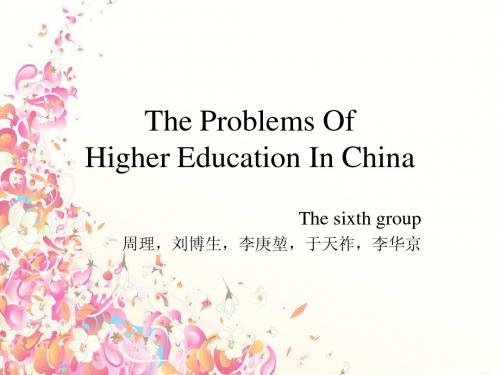
Thank you!
Thousands of troops on a single-log bridge
Compete to enter prestigious institutions (Project 985, 211)
Challenges of higher education (1/4)
• Challenges in three aspects
• Two-and Three-year
• An additional two-year programme
The problems in higher education
• Tuition fees • Development of student numbers • Challenges in higher education
Solutions for those Challenges
Government must be well aware of this challenges
The improvement of education in rural areas should be addressed
Giving the poverty-stricken areas various aspects of supportive measures
Distribution of opportunities between core and fringe populations Unemployment of university graduates Quality of higher education
Challenges of higher education (2/4)
My View on Some Problems in China's Higher Education
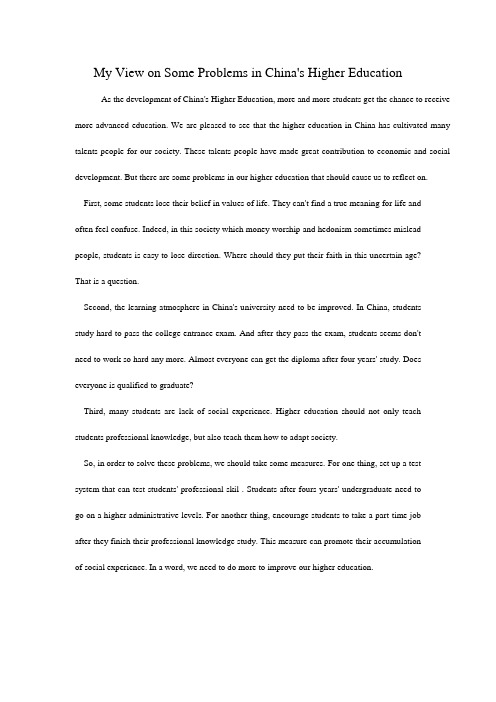
My View on Some Problems in China's Higher EducationAs the development of China's Higher Education, more and more students get the chance to receive more advanced education. We are pleased to see that the higher education in China has cultivated many talents people for our society. These talents people have made great contribution to economic and social development. But there are some problems in our higher education that should cause us to reflect on. First, some students lose their belief in values of life. They can't find a true meaning for life andoften feel confuse. Indeed, in this society which money worship and hedonism sometimes mislead people, students is easy to lose direction. Where should they put their faith in this uncertain age?That is a question.Second, the learning atmosphere in China's university need to be improved. In China, studentsstudy hard to pass the college entrance exam. And after they pass the exam, students seems don'tneed to work so hard any more. Almost everyone can get the diploma after four years' study. Does everyone is qualified to graduate?Third, many students are lack of social experience. Higher education should not only teach students professional knowledge, but also teach them how to adapt society.So, in order to solve these problems, we should take some measures. For one thing, set up a test system that can test students' professional skil . Students after fours years' undergraduate need togo on a higher administrative levels. For another thing, encourage students to take a part-time jobafter they finish their professional knowledge study. This measure can promote their accumulationof social experience. In a word, we need to do more to improve our higher education.。
(完整word版)Some Problems in China’s Higher Education
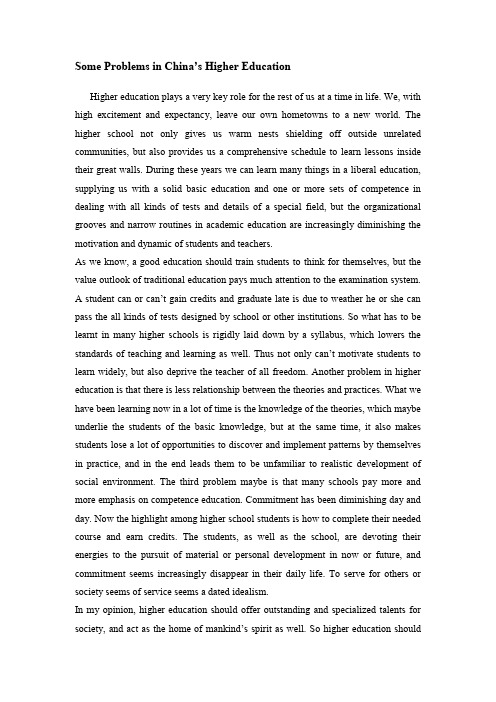
Some Problems in China’s Higher EducationHigher education plays a very key role for the rest of us at a time in life. We, with high excitement and expectancy, leave our own hometowns to a new world. The higher school not only gives us warm nests shielding off outside unrelated communities, but also provides us a comprehensive schedule to learn lessons inside their great walls. During these years we can learn many things in a liberal education, supplying us with a solid basic education and one or more sets of competence in dealing with all kinds of tests and details of a special field, but the organizational grooves and narrow routines in academic education are increasingly diminishing the motivation and dynamic of students and teachers.As we know, a good education should train students to think for themselves, but the value outlook of traditional education pays much attention to the examination system.A student can or can’t gain credits and graduate late is due to weather he or she can pass the all kinds of tests designed by school or other institutions. So what has to be learnt in many higher schools is rigidly laid down by a syllabus, which lowers the standards of teaching and learning as well. Thus not only can’t motivate students to learn widely, but also deprive the teacher of all freedom. Another problem in higher education is that there is less relationship between the theories and practices. What we have been learning now in a lot of time is the knowledge of the theories, which maybe underlie the students of the basic knowledge, but at the same time, it also makes students lose a lot of opportunities to discover and implement patterns by themselves in practice, and in the end leads them to be unfamiliar to realistic development of social environment. The third problem maybe is that many schools pay more and more emphasis on competence education. Commitment has been diminishing day and day. Now the highlight among higher school students is how to complete their needed course and earn credits. The students, as well as the school, are devoting their energies to the pursuit of material or personal development in now or future, and commitment seems increasingly disappear in their daily life. To serve for others or society seems of service seems a dated idealism.In my opinion, higher education should offer outstanding and specialized talents for society, and act as the home of mankind’s spirit as well. So higher education shouldfind some equilibrium pots among universities, government and society on the one hand, and on the other, set up equilibrium between economic interest and moral civilization. Only if higher education in China sets up the equilibrium and keeps it well, society would find the graduate students it needs and the graduate students could find their appropriate position in society, and real masters would arise in the future.The problems you mentioned are not specific to the educational systems in China. What is needed, as many experts concur, is a series of mandatory courses in ethics and moral studies, which are often lacked in most educational systems in the world. And the schools' effort to make these courses a requisite for all students might be impractical due to many materialistic concerns because of the value system the society has place upon its citizens. As you have more than subtly hinted in your article, just as equally important to a person as the person's academic achievement are her sense of self-worthiness, -respect, -esteem, her ability to think critically and independently, her ethic standard, and her commitment to her civic responsibilities as a citizen of her country. These are aspects of life a mere degree in higher education cannot offer to its recipient.This problem is not a simple thing to change. There are many things to improve Chinese education mechanism. We can only discuss some aspects of this problem and express ourselves. However, it will only be solved when most of chinese people realize and have an incentive to correct this problem.Wish that this day will come earlier!Differences between Chinese and Western Education[Abstract]:Most Chinese parents like to ask, “How old should be the best age for children to study overseas?” “Is the foundational education as good as China in other countries?” As the matt er of fact, the argument about the differences and their advantages and disadvantages between Chinese Education and Western Education is keeping on all the time. This question is also one major concern among those students who are considering going abroad. In order to find out the most suitable way for eachindividual, we shall compare matters both in China and foreign countries in this paper.摘要:大多数华人家长要问: “孩子出国留学的最佳年龄是多少?” “其他国家的基础教育跟我过的一样么?”。
Educational Problems in China
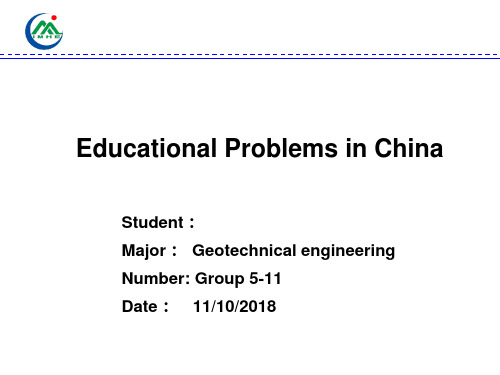
Student: Major: Geotechnical engineering Number: Group 5-11 Date: 11/10/2018
Educational Problems in China
With the development of China's society and the enhancement of its economy, China's education has made great progress, and many children will not have to drop out of school because of poverty. Most of the students can enter the university to receive higher education .
Educational Problems in China
New education
Educational Problems in China
Of course, the above is my personal opinion. There is still a long way to go to improve China's education. If the government pay attention to it and tries to solve it, I believe that China's education has a bright future.
Educational Problems in China
Standard-oriented education
TheproblemsinChina中国教育存在的问题
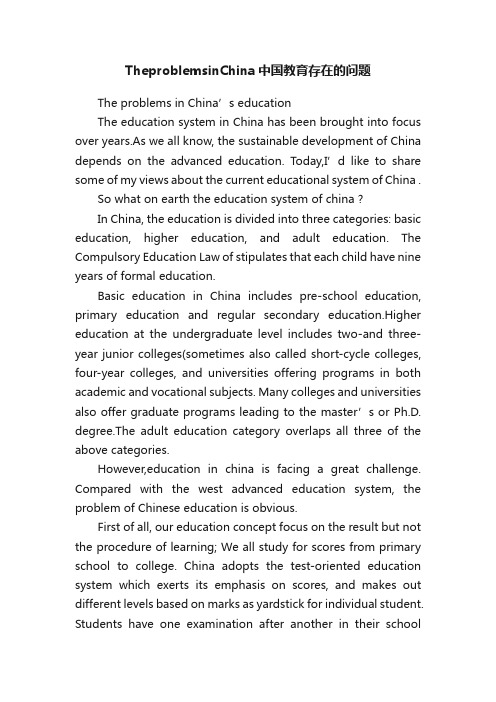
TheproblemsinChina中国教育存在的问题The problems in China’s educationThe education system in China has been brought into focus over years.As we all know, the sustainable development of China depends on the advanced education. Today,I’d like to share some of my views about the current educational system of China .So what on earth the education system of china ?In China, the education is divided into three categories: basic education, higher education, and adult education. The Compulsory Education Law of stipulates that each child have nine years of formal education.Basic education in China includes pre-school education, primary education and regular secondary education.Higher education at the undergraduate level includes two-and three-year junior colleges(sometimes also called short-cycle colleges, four-year colleges, and universities offering programs in both academic and vocational subjects. Many colleges and universities also offer graduate programs leading to the master’s or Ph.D. degree.The adult education category overlaps all three of the above categories.However,education in china is facing a great challenge. Compared with the west advanced education system, the problem of Chinese education is obvious.First of all, our education concept focus on the result but not the procedure of learning; We all study for scores from primary school to college. China adopts the test-oriented education system which exerts its emphasis on scores, and makes out different levels based on marks as yardstick for individual student. Students have one examination after another in their schoollife.Nonetheless, high scores don’t mean good ability, while capable students are capable in their own ways. Burying in examinations, students may have rich theories but poor practices, blocking them to survival from society after graduation. Meanwhile, imagination and creation are more and more away from students.Secondly , under our education, students should obey what the education department, schools, teachers and even textbooks tell them, which is authoritative. The education department has created an education standard and education mode that they can easily control it. And schools make regulations to restrict studen ts. besides, teachers usually stand in front of teachers’ desks giving a lesson to dozens of students who just keep taking notes and seldom do they raise any question during a class.A foreigner student has said in China a student's role is to listen and watch.Finaly,diploma is the only measurement of our ability; we can't obtain a good job without a rich-enough diploma, say nothing of promotion .What’s more,in order to enter a higher grade is the aim of education, students, as well as parents and schools have paid much attention to high school, and ignored the technical schools and Normal schools. And this has made lots of graduates from many colleges and universities in a dilemma that they find no jobs while a qualified Senior technician is hard to find.Some say that the education system has to be reformed immediately, otherwise, the purpose of sustainable development of China is just a fantasy. I cannot agree with it more. And in my own opinions, we should reform the education system in three parts.First, pay attention to the education procedures.The country should refresh the view of the traditional values of human resources, we should abandon the thought of score being the most important. The school should focus on the procedure of study and try to improve the integrated ability of students.Second, improve the capability of the teachers. A good teacher should treat the students kindly and give them advices in various fields for a teacher is due to not only enhance the imagination and creativity of the students, but also tell them the right way of living and treating the world.Third,Of course, there is a rather long way to go to improve education in China. Also, there are many other problems to be solved. However, if the government pay much attention to it and manage to solve it, I believe education has a bright future.。
china's higher英语作文

The Rise of China's Higher EducationIn recent decades, China has emerged as a global leader in higher education, experiencing unprecedented growth and transformation. This rapid ascension can be attributed to several key factors, including government investment, educational reforms, and a strong focus on research and innovation.The Chinese government has played a pivotal role in driving the expansion of higher education. Substantial investments have been made in building new universities and expanding existing institutions, resulting in a significant increase in the number of higher education institutions and students. This has created a vibrant academic environment that fosters competition and excellence.Moreover, China has implemented sweeping educational reforms to improve the quality of its higher education system. These reforms have focused on enhancing the curriculum, strengthening teacher training, and improving teaching methods. These efforts have paid off, as China's universities are nowrecognized worldwide for their academic excellence and research capabilities.Another key factor in China's higher education rise is its strong focus on research and innovation. Chinese universities are 鼓励to collaborate with industries and government agencies to conduct cutting-edge research that addresses national and global challenges. This focus on innovation has led to significant breakthroughs in areas such as artificial intelligence, biotechnology, and materials science.The rise of China's higher education has not only transformed the country's educational landscape but has also had a profound impact on the global higher education community. Chinese universities are now actively collaborating with institutions from around the world, sharing research findings and best practices. This cross-cultural exchange has enriched the global academic community and promoted the development of more inclusive and diverse higher education systems.In conclusion, the rise of China's higher education is atestament to the country's dedication to education and innovation. By investing in infrastructure, implementing reforms, and fostering a culture of research and innovation, China has established itself as a leader in higher education. This transformation is not only shaping the future of China but also contributing to the global advancement of knowledge and understanding.**中国高等教育的崛起**近几十年来,中国已经成为全球高等教育的领导者,经历了前所未有的增长和变革。
中国教育问题英语作文
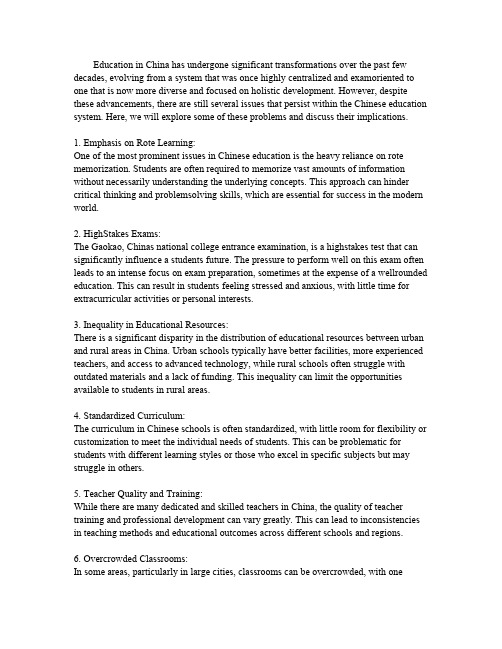
Education in China has undergone significant transformations over the past few decades,evolving from a system that was once highly centralized and examoriented to one that is now more diverse and focused on holistic development.However,despite these advancements,there are still several issues that persist within the Chinese education system.Here,we will explore some of these problems and discuss their implications.1.Emphasis on Rote Learning:One of the most prominent issues in Chinese education is the heavy reliance on rote memorization.Students are often required to memorize vast amounts of information without necessarily understanding the underlying concepts.This approach can hinder critical thinking and problemsolving skills,which are essential for success in the modern world.2.HighStakes Exams:The Gaokao,Chinas national college entrance examination,is a highstakes test that can significantly influence a students future.The pressure to perform well on this exam often leads to an intense focus on exam preparation,sometimes at the expense of a wellrounded education.This can result in students feeling stressed and anxious,with little time for extracurricular activities or personal interests.3.Inequality in Educational Resources:There is a significant disparity in the distribution of educational resources between urban and rural areas in China.Urban schools typically have better facilities,more experienced teachers,and access to advanced technology,while rural schools often struggle with outdated materials and a lack of funding.This inequality can limit the opportunities available to students in rural areas.4.Standardized Curriculum:The curriculum in Chinese schools is often standardized,with little room for flexibility or customization to meet the individual needs of students.This can be problematic for students with different learning styles or those who excel in specific subjects but may struggle in others.5.Teacher Quality and Training:While there are many dedicated and skilled teachers in China,the quality of teacher training and professional development can vary greatly.This can lead to inconsistencies in teaching methods and educational outcomes across different schools and regions.6.Overcrowded Classrooms:In some areas,particularly in large cities,classrooms can be overcrowded,with oneteacher responsible for dozens of students.This can make it difficult for teachers to provide individual attention to each student,potentially leading to a less effective learning environment.ck of Creativity and Innovation:The Chinese education system has been criticized for not fostering creativity and innovation.The focus on memorization and standardized testing can discourage students from thinking outside the box or pursuing their own unique ideas and interests.8.Pressure and Mental Health:The intense academic pressure faced by Chinese students can have serious implications for their mental health.Anxiety,depression,and even suicide rates among students are concerning,highlighting the need for a more balanced approach to education that prioritizes wellbeing.9.Internationalization and Language Proficiency:While English is taught as a second language in many Chinese schools,the focus on grammar and vocabulary often overshadows the development of practical language skills. This can make it challenging for students to communicate effectively in English,which is increasingly important in a globalized world.10.Transition to Higher Education:The transition from secondary to higher education can be difficult for many students in China.The academic culture and expectations in universities can be quite different from those in secondary schools,and students may struggle to adapt.Addressing these issues requires a multifaceted approach,including policy changes, increased funding for education,and a shift in cultural attitudes towards learning.By focusing on a more balanced and inclusive education system,China can continue to develop a workforce that is not only knowledgeable but also innovative and adaptable to the challenges of the21st century.。
中国在高等教育方面的成就英语作文
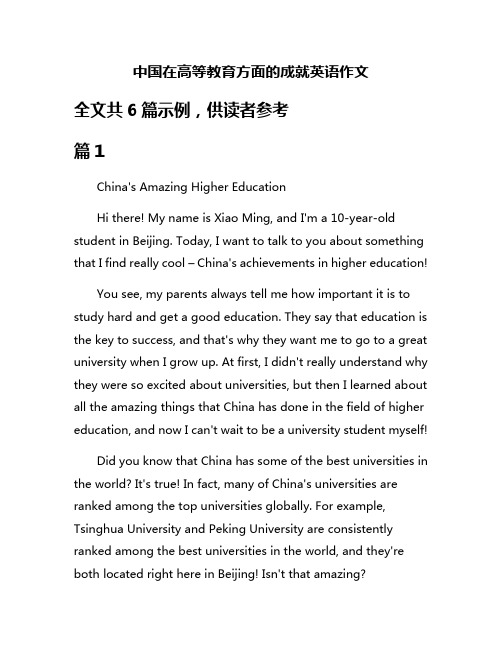
中国在高等教育方面的成就英语作文全文共6篇示例,供读者参考篇1China's Amazing Higher EducationHi there! My name is Xiao Ming, and I'm a 10-year-old student in Beijing. Today, I want to talk to you about something that I find really cool – China's achievements in higher education!You see, my parents always tell me how important it is to study hard and get a good education. They say that education is the key to success, and that's why they want me to go to a great university when I grow up. At first, I didn't really understand why they were so excited about universities, but then I learned about all the amazing things that China has done in the field of higher education, and now I can't wait to be a university student myself!Did you know that China has some of the best universities in the world? It's true! In fact, many of China's universities are ranked among the top universities globally. For example, Tsinghua University and Peking University are consistently ranked among the best universities in the world, and they're both located right here in Beijing! Isn't that amazing?But it's not just about rankings. China's universities are also doing incredible research and making groundbreaking discoveries in all kinds of fields. For instance, scientists at China's universities have made important contributions to areas like medicine, technology, and space exploration. Just think about it – the next big medical breakthrough or the next generation of smartphones or even the next mission to Mars could come from a Chinese university!Another thing that I think is really cool is how many international students come to study at Chinese universities. China is becoming a popular destination for students from all over the world who want to get a high-quality education. Imagine having classmates and friends from dozens of different countries – how awesome would that be?And you know what else? China is investing a lot of money and resources into improving its higher education system. The government is building new universities, hiring top professors from around the world, and providing scholarships to help students afford a university education. This means that more and more Chinese students like me will have the opportunity to attend a great university and get the education we need to succeed in life.I still have a few years before I have to start thinking about universities, but I'm already excited about the possibilities. Maybe I'll study engineering and help design the next generation of high-speed trains or skyscrapers. Or maybe I'll become a scientist and work on finding cures for diseases or developing new sources of clean energy. The possibilities are endless!China's achievements in higher education are really inspiring to me. It shows how far our country has come and how much we value education and knowledge. I can't wait to be a part of this amazing system and contribute to China's continued success in the future.So, whether you're a student like me or an adult who's already finished school, I hope you'll take a moment to appreciate all the incredible things that China has accomplished in higher education. It's something that we should all be proud of, and it's just one more reason why China is such an amazing country.That's all from me for now. Time for me to get back to my homework – gotta keep those grades up if I want to get into a top university one day! Thanks for reading, and remember: study hard, dream big, and go China!篇2China's Amazing Higher Education SystemHi there! My name is Xiaoming, and I'm a 10-year-old student from Beijing. Today, I want to tell you all about China's incredible achievements in higher education. I know it might seem like a big topic for a kid like me, but I've been learning about it in school, and I find it super fascinating!First of all, let me tell you a little bit about the history of higher education in China. Did you know that China has a long tradition of valuing education and learning? Way back in ancient times, Chinese scholars and philosophers like Confucius taught that education was the key to personal growth and a harmonious society.Over the centuries, China has established many famous universities and institutions of higher learning. Some of the oldest and most prestigious ones, like Tsinghua University and Peking University, have been around for over a hundred years! These universities have produced countless scholars, scientists, and leaders who have made incredible contributions to the world.But enough about the past – let's talk about what's happening in China's higher education system today! One of the most impressive things is how quickly it has grown and developed in recent decades. China now has the largest higher education system in the world, with over 2,600 universities and colleges!Every year, millions of students in China take the National College Entrance Examination, also known as the "Gaokao." It's a really tough exam, but those who do well get to attend some of the best universities in the country. My older sister is currently studying at a top university in Shanghai, and she says the campus is huge, with state-of-the-art facilities and world-class professors.Speaking of professors, China has been working hard to attract and retain talented scholars and researchers from all over the world. Many international experts have been drawn to China's prestigious universities and well-funded research programs. This has helped China become a global leader in cutting-edge fields like artificial intelligence, renewable energy, and biotechnology.But it's not just about science and technology – China's universities also excel in many other areas. For example,programs in disciplines like business, finance, and economics have gained international recognition. And let's not forget about the arts and humanities – China has produced countless talented writers, artists, and philosophers throughout history, and this tradition continues today.One of the things I find really cool is how China has been promoting international cooperation and exchange in higher education. Lots of Chinese students go abroad to study, and at the same time, many international students come to study in China. This cross-cultural exchange of ideas and perspectives is so valuable, and it helps foster greater understanding and collaboration between people from different backgrounds.Overall, I think China's achievements in higher education are truly impressive. From ancient times to the present day, education has been deeply valued in Chinese culture, and this commitment has paid off in so many ways. I'm really proud of my country's progress in this area, and I can't wait to see what the future holds!Well, that's about all I have to say on this topic. I hope you found my essay informative and interesting, even though I'm just a kid. Who knows, maybe one day I'll get to attend one of China's top universities myself and contribute to the country's ongoingsuccess in higher education! For now, I better get back to my homework. Thanks for reading, and have a great day!篇3Certainly! Here's an essay on China's achievements in higher education, written in English with a primary school student's tone and around 2,000 words:China's Amazing Strides in Higher EducationHiya, friends! Today, I'm going to tell you all about the incredible things China has done in the world of higher education. It's a really important topic, and I'm excited to share what I've learned with you.First, let's talk about how many universities China has. Did you know that there are over 2,600 universities and colleges in the country? That's a lot of places for people to go and get super smart! Some of the most famous ones are Tsinghua University, Peking University, and Fudan University. These schools have been around for a really, really long time and are known all over the world for being excellent places to study.But it's not just about having a lot of universities. China has also made education much more accessible to everyone. In thepast, it was tough for some people to go to college, especially if their families didn't have a lot of money. However, the government has worked hard to make sure that more people can get a higher education, no matter their background.One way they've done this is by building new universities in smaller cities and rural areas. This means that students who live far away from the big cities can still attend college without having to move too far from home. Isn't that cool? They've also provided a lot of financial aid and scholarships to help students afford tuition and other expenses.Another awesome thing about higher education in China is how much emphasis is placed on science, technology, engineering, and math (STEM) subjects. These are really important fields that help drive innovation and progress. China has invested a ton of money into STEM research and has some of the best facilities and equipment in the world.Imagine having access to state-of-the-art laboratories, super-powerful computers, and cutting-edge technology! It's like being in a real-life science fiction movie. And because of this focus on STEM, China has produced tons of brilliant scientists, engineers, and inventors who have made amazing discoveries and created incredible new technologies.But it's not just about STEM – China also values the arts, humanities, and social sciences. After all, a well-rounded education is crucial for understanding the world and appreciating different cultures. Chinese universities offer a wide range of programs in fields like literature, history, philosophy, and more.Speaking of different cultures, one of the coolest things about higher education in China is how international it has become. Universities have welcomed students and scholars from all over the globe, creating a diverse and enriching learning environment. Can you imagine being in a classroom with people from different countries, speaking different languages, and sharing their unique perspectives? It's like going on an adventure without even leaving campus!And it's not just students – Chinese universities have also attracted top professors and researchers from around the world. These brilliant minds have brought their expertise andcutting-edge ideas to China, helping to advance knowledge and push the boundaries of what's possible.But enough about the academics – let's talk about something really fun: campus life! Chinese universities are known for having beautiful campuses with stunning architecture, lushgardens, and all sorts of cool facilities. Some even have their own museums, art galleries, and performance spaces!And when you're not busy studying, there are tons of clubs, activities, and events to get involved in. You could join a sports team, learn a new instrument, or even start your own club for something you're passionate about. The possibilities are endless!Imagine working for a cutting-edge tech company, helping to develop the next big innovation that changes the world. Or maybe you'll become a successful entrepreneur and start your own business. The sky's the limit when you have a world-class education under your belt!So, there you have it, friends – a glimpse into the amazing world of higher education in China. From state-of-the-art facilities and top-notch programs to a diverse and enriching campus life, Chinese universities have so much to offer.And the best part? All of these achievements and advancements aren't just benefiting China – they're helping to push the boundaries of human knowledge and progress for the whole world. How cool is that?I hope this has inspired you to dream big and maybe even consider pursuing higher education in China one day. Whoknows, you could be the next brilliant mind to make a groundbreaking discovery or create something that changes the world forever!篇4China's Great Leap Forward in Higher EducationHi everyone! Today I want to tell you all about the incredible progress China has made in higher education. It's really amazing how far they've come in just a few decades. Higher education, which means colleges and universities, is super important for developing bright minds and creating new ideas to make the world better.Let me start from the beginning. Back in the 1970s, universities in China were not in a good place. They didn't have much funding or resources. And there weren't that many people who went to college - only around 2 out of every 100 young adults! Can you imagine? That's like if only 2 kids in your whole grade level could go to university. Wild, right?But then something incredible happened. In 1978, China's leaders realized that education, especially higher education, was the key to becoming a strong, modern country. They started reforming the universities and pouring in lots of money toimprove them. More students could enroll. New buildings and labs were constructed. The best professors were hired from around the world.And boy, did it pay off! Since those reforms started, over 30 million students have graduated from Chinese universities. 30 million - that's more people than live in my entire country! Enrollment has skyrocketed from those few students back in the 70s to over 30 million students now attending universities across China. It's the largest higher education system in the world.Not only that, but the quality has improved by leaps and bounds too. China now has some of the best universities on the planet. You've probably heard of famous ones like Tsinghua, Peking, and Fudan. They attract super smart students and professors from all over the globe who want to study and research there. Chinese grads are going on to createworld-changing technologies, businesses, medical breakthroughs and more.China spends huge amounts of money, billions upon billions, to keep building new campuses and facilities with the latest lab equipment and technology. They set up partnerships and exchange programs with top universities worldwide too. It's allpart of their goal to be a global leader in higher education and innovation.One of the coolest things is China's push to bring higher ed opportunities to every corner of the country. Traditionally, the elite universities were clustered in just a few major cities. But now there are great colleges opening up in smaller cities and rural provinces. This gives more people access to higher learning, no matter where they're from. There are even mobile universities that drive from town to town! How neat is that?I find it truly inspiring how China completely turned its higher education system around in just a few decades. With committed leadership and massive investments, they evolved from having virtually no university opportunities to offering world-class higher education on an enormous scale. It's helping China become an economic and technological superpower on the global stage.Who knows what spectacular innovations and discoveries will emerge thanks to these millions of university-educated Chinese minds? Maybe one of you will be part of the next generation helping to push human knowledge even further. China's transformation in higher ed proves that with vision andhard work, anything is possible. That's a lesson we can all learn from.Those are just some of the highlights of China's astronomical rise in the realm of higher education in recent years. It's been a remarkable journey of growth and progress. I hope you found it as fascinating as I do! Let me know if you have any other questions.篇5China's Big Steps in Higher EducationHello, everyone! My name is Xiaoming, and I'm a primary school student who loves learning about different topics. Today, I want to share with you some amazing things I've learned about China's achievements in higher education.First of all, let me tell you a bit about higher education. It's the education that happens after high school, like universities and colleges. In China, we have many famous universities that are among the best in the world. Some of them are Tsinghua University, Peking University, and Fudan University.Did you know that China has the largest higher education system in the world? That's right! There are over 2,600universities and colleges in China, with millions of students studying all kinds of subjects. Isn't that incredible?One of the biggest achievements in China's higher education is how quickly it has grown. Just a few decades ago, not many people in China could go to university. But now, more and more students are able to get a higher education. This is because the government has been working hard to build more universities and make them accessible to everyone.Another amazing thing about China's higher education is how it's becoming more international. Universities in China are welcoming students and professors from all over the world. They are also encouraging Chinese students to study abroad and learn from other countries. This helps people understand different cultures and ideas, which is really important in our connected world.You might be wondering, "What do people study in Chinese universities?" Well, they study all sorts of subjects, just like in other countries. Some popular areas are science, engineering, medicine, business, and humanities like literature and history. Many Chinese universities are especially strong in areas like technology, mathematics, and physics.One really cool thing about Chinese universities is how they use the latest technology in teaching and research. For example, some universities have virtual reality labs where students can explore different environments and scenarios. Others have super-fast computers that can process huge amounts of data for scientific research.But it's not just about technology. Chinese universities also value traditional culture and knowledge. Many of them have programs and courses that teach ancient Chinese philosophy, literature, and arts. This helps students understand and appreciate their rich cultural heritage.So, those are some of the amazing achievements of China's higher education system. From having the largest number of universities to using cutting-edge technology and valuing traditional culture, China is really making big strides in this area.As a primary school student, I find it all very fascinating. Who knows, maybe one day I'll get to attend one of those famous Chinese universities and contribute to the country's progress in higher education!That's all from me for now. I hope you found this essay interesting and learned something new about China'sachievements in higher education. Remember, education is the key to a brighter future, so keep studying and learning!篇6China's Super Schools!Hi friends! Today I want to tell you all about the amazing universities and colleges in my country, China. We have some of the best schools in the whole world for getting a great education after high school. Let me share some awesome facts about higher education in China!First, let me explain what a university or college is. After you finish regular school up to 12th grade, you can continue studying at a university or college. These are like super schools for adults to learn lots of important things to prepare for future careers. Universities are a bit bigger and offer more subjects like science, engineering, medicine and such. Colleges are a little smaller and focus on fewer subjects.China has over 2,600 universities and colleges! That's a huge number. Some of the most famous ones are in big cities like Beijing, Shanghai and Guangzhou. A few incredibly old universities like Nanjing University have been around for over 100 years. Pretty cool, right?Millions and millions of students attend university in China each year. In fact, China has the largest number of university students in the world! Can you imagine how many backpacks and pencils they all need? No wonder stationery stores are always so busy here.Many of China's universities are ranked among the very best globally. Two awesome ones that make it to the world's top 100 list are Tsinghua University in Beijing and Peking University, also in Beijing. Students from all over the world dream of studying there. I hope I can get in when I'm older!Chinese universities are getting popular with international students too. More and more kids from other countries are coming here to study everything from business to science. Having classmates from different cultures sounds like so much fun! Maybe I'll make penpals from Brazil or Spain someday.You know what the coolest thing about universities here is? The campuses are like small cities with libraries, dorms, cafeterias, gyms and even museums! Some universities have incredible old buildings from hundreds of years ago with gorgeous gardens all around. I went to visit a friend's brother at Beijing Normal University once and couldn't believe how big and pretty the campus was.University life isn't just about studying though. Students get to join all sorts of awesome clubs like music, dance, coding, you name it! They can play sports, put up theatre shows and go on field trips too. I can't wait for that experience someday.A university degree from China is treated with a lot of respect around the world. Graduates from Chinese universities get hired at top companies globally. Many have gone on to make remarkable inventions and discoveries that have changed the world we live in!That's not all - China is also a leader in special programs like distance education. Thousands of students from remote areas can attend online classes from universities. China has also opened tons of international branch campuses overseas so even more students globally can access its excellent education.As you can see, higher education in China is booming! Our universities are at the cutting-edge of teaching, research and innovation. I'm so proud of what my country has accomplished in this field. I'll be sure to work super hard so I can attend one of these amazing universities in the future.Well, that's all for my essay! Let me know if you have any other questions about schools and colleges here. For now, it's back to kiddie homework for me. Study hard, friends!。
中国教育问题英语作文
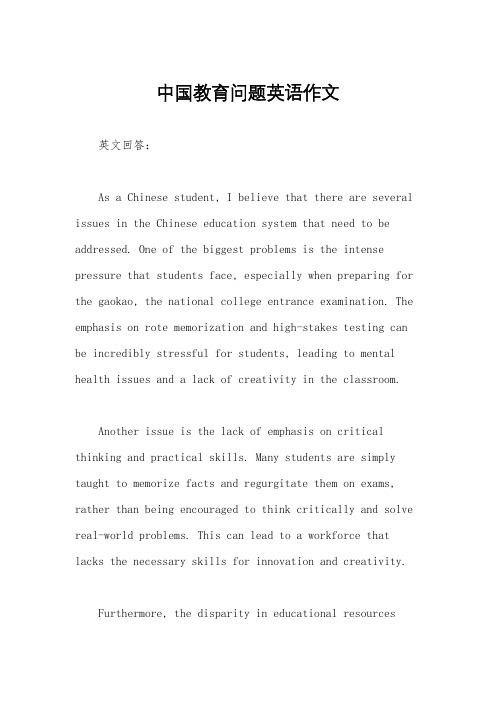
中国教育问题英语作文英文回答:As a Chinese student, I believe that there are several issues in the Chinese education system that need to be addressed. One of the biggest problems is the intense pressure that students face, especially when preparing for the gaokao, the national college entrance examination. The emphasis on rote memorization and high-stakes testing can be incredibly stressful for students, leading to mental health issues and a lack of creativity in the classroom.Another issue is the lack of emphasis on critical thinking and practical skills. Many students are simply taught to memorize facts and regurgitate them on exams, rather than being encouraged to think critically and solve real-world problems. This can lead to a workforce that lacks the necessary skills for innovation and creativity.Furthermore, the disparity in educational resourcesbetween urban and rural areas is a significant problem. Students in rural areas often have limited access toquality teachers and educational materials, putting them at a disadvantage compared to their urban counterparts.In my opinion, these issues need to be addressed in order to improve the Chinese education system and better prepare students for the challenges of the 21st century.中文回答:作为一名中国学生,我认为中国教育系统存在一些问题需要解决。
中国青少年问题英语作文
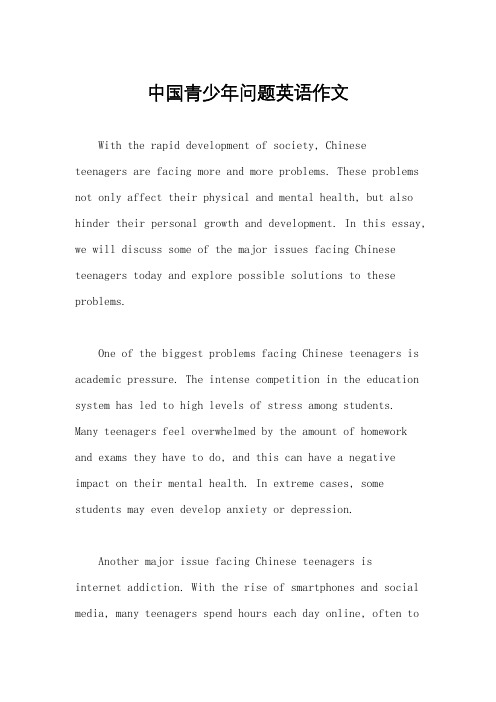
中国青少年问题英语作文With the rapid development of society, Chineseteenagers are facing more and more problems. These problems not only affect their physical and mental health, but also hinder their personal growth and development. In this essay, we will discuss some of the major issues facing Chinese teenagers today and explore possible solutions to these problems.One of the biggest problems facing Chinese teenagers is academic pressure. The intense competition in the education system has led to high levels of stress among students. Many teenagers feel overwhelmed by the amount of homework and exams they have to do, and this can have a negative impact on their mental health. In extreme cases, some students may even develop anxiety or depression.Another major issue facing Chinese teenagers isinternet addiction. With the rise of smartphones and social media, many teenagers spend hours each day online, often tothe detriment of their studies and social life. Internet addiction can lead to a range of problems, including poor academic performance, lack of sleep, and even physicalhealth issues.In addition to academic pressure and internet addiction, Chinese teenagers also face challenges in terms of social relationships. Many teenagers struggle to communicate effectively with their peers and may feel isolated or lonely. This can have a negative impact on their mental health and overall well-being.So, what can be done to address these problems facing Chinese teenagers? One possible solution is to reform the education system to reduce academic pressure. Schools could implement measures such as reducing the amount of homework and exams, providing more support for students who are struggling, and promoting a more holistic approach to education that values creativity and critical thinking.In terms of internet addiction, parents and schools could work together to set limits on teenagers' screen timeand encourage them to engage in other activities, such as sports or hobbies. It is also important for teenagers to be educated about the potential dangers of excessive internet use and how to use technology in a healthy and responsible way.Finally, to address social relationship issues, schools could implement programs to promote social skills and emotional intelligence among students. Teachers could also provide support for students who are struggling with social relationships and create a more inclusive and supportive school environment.In conclusion, Chinese teenagers face a range of challenges in today's society, from academic pressure to internet addiction to social relationship issues. By implementing reforms in the education system, promoting healthy technology use, and supporting social skills development, we can help teenagers overcome these problems and thrive in their personal growth and development.。
中国高等教育英语作文
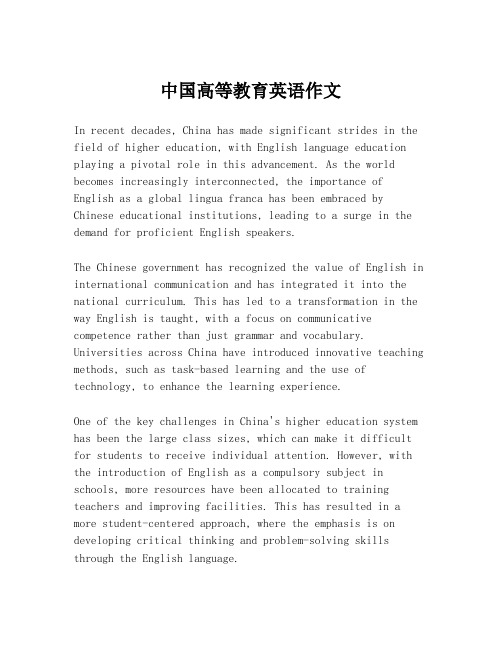
中国高等教育英语作文In recent decades, China has made significant strides in the field of higher education, with English language education playing a pivotal role in this advancement. As the world becomes increasingly interconnected, the importance of English as a global lingua franca has been embraced by Chinese educational institutions, leading to a surge in the demand for proficient English speakers.The Chinese government has recognized the value of English in international communication and has integrated it into the national curriculum. This has led to a transformation in the way English is taught, with a focus on communicative competence rather than just grammar and vocabulary. Universities across China have introduced innovative teaching methods, such as task-based learning and the use of technology, to enhance the learning experience.One of the key challenges in China's higher education system has been the large class sizes, which can make it difficult for students to receive individual attention. However, with the introduction of English as a compulsory subject in schools, more resources have been allocated to training teachers and improving facilities. This has resulted in a more student-centered approach, where the emphasis is on developing critical thinking and problem-solving skills through the English language.Another significant development in China's higher education is the internationalization of universities. Manyinstitutions have established partnerships with foreign universities, offering dual-degree programs and encouraging student exchanges. This exposure to international academic environments has not only improved the quality of English education but also fostered a more global outlook among students.The demand for English proficiency extends beyond the academic realm. With China's growing economy and its role in global affairs, there is an increasing need for professionals who can communicate effectively in English. This has led to a rise in the number of English language tests, such as IELTS and TOEFL, being taken by Chinese students who wish to pursue further studies or work opportunities abroad.Despite the progress made, there are still areas for improvement. One such area is the need for more cultural exchange and understanding. English education in China often focuses on the language itself rather than the cultural nuances that come with it. Incorporating cultural studiesinto the curriculum can help students become more effective communicators and better prepared for the global workplace.In conclusion, the evolution of higher education in China, particularly in the realm of English language education, has been remarkable. The country's commitment to improving the quality of English teaching and learning has not only enhanced the academic experience for students but also prepared them for the global stage. As China continues toopen up and engage with the world, the role of English in its higher education system will undoubtedly remain crucial.。
中国教育存在的问题英语作文

中国教育存在的问题英语作文With the rapid economic development, China has made significant progress in education. However, there still exist multiple problems that need to be addressed to improve the quality of education.Firstly, the unequal distribution of educational resources is a significant problem in China. The majority of high-quality schools are concentrated in big cities, while students in rural areas and small towns are often left with limited resources and low-quality education. This discrepancy leads to a gap in education levels between different regions, and ultimately a lack of social equality.Secondly, the focus on rote memorization has become a deficiency of the education system in China. Students in China are required to memorize a large amount of facts and knowledge, neglecting critical thinking skills and practical ability. This teaching method leads to a lack of creativity and flexibility in students, which is increasingly incompatible with the needs of modern society.Thirdly, the intense competition in education has resulted in a significant burden on students, parents, and teachers. With a national obsession with high test scores, students often suffer from excessive homework, tutorials, and exams to improve their academic achievements. This situation results in physical andmental exhaustion among students, placing a significant mental health burden on the younger generation.Finally, the education system in China has long been criticized for its lack of art and physical education. The education system prioritizes core subjects such as Math, English, and Science, and often disregards art and physical education. However, art and physical education are an essential part of a comprehensive education, providing students with a balanced and healthy lifestyle.In conclusion, it is vital to address these issues to improve the quality of China's education. The government should pay more attention to the distribution of educational resources and improve teaching methods by encouraging creativity and practicality. Moreover, reducing the burden of competition on students and promoting a balanced curriculum is essential to achieve a better education system. By doing so, we can cultivate an innovative and diverse generation that can thrive in the complex global society.。
中国教育问题 英语作文

中国教育问题英语作文In recent years, the education system in China has been facing various challenges. One of the most prominent issues is the intense pressure on students to perform well in exams. This has led to a highly competitive and stressful learning environment, which can have negative effects on students' mental health.Another problem is the lack of creativity and critical thinking in the education system. The focus on rote memorization and standardized testing has hinderedstudents' ability to think independently and creatively. This is a significant obstacle to the development of a more innovative and entrepreneurial society.Furthermore, there is a disparity in the quality of education between urban and rural areas. Students in rural areas often have limited access to resources and qualified teachers, which puts them at a disadvantage compared to their urban counterparts. This contributes to the overallinequality in educational opportunities in China.Moreover, the rigid curriculum and teaching methods do not cater to the diverse learning needs of students. Many students have different learning styles and strengths, but the one-size-fits-all approach in education fails to address these individual differences. As a result, some students may struggle to keep up with the pace of the classroom.In addition, the emphasis on academic achievement has overshadowed the importance of holistic education. The focus on exam results has led to the neglect of other essential aspects of education, such as character development, moral education, and practical skills. This narrow focus on academic success may not adequately prepare students for the challenges of the real world.In conclusion, the education system in China is facing several significant challenges that need to be addressed. These issues include the pressure on students, the lack of creativity and critical thinking, the urban-rural educationgap, the rigid curriculum, and the neglect of holistic education. It is crucial to reform the education system to better meet the diverse needs of students and to cultivate a more well-rounded and innovative generation.。
中国教育问题 英语作文

中国教育问题英语作文英文回答:Educational challenges in China run deep and manifest in various forms, from a rigid and exam-oriented system to inadequate resources and inequitable access.Exam-Oriented System:China's education places an overwhelming emphasis on high-stakes exams, such as the Gaokao, which plays apivotal role in university admissions and career prospects. This narrow focus on rote memorization and test-taking skills stifles creativity, critical thinking, and holistic development.Inadequate Resources:Educational institutions in rural areas often face severe shortages of qualified teachers, modern equipment,and infrastructure. Libraries may lack essential materials, and classrooms can be overcrowded or dilapidated. These disparities limit students' access to quality education and exacerbate educational inequalities.Inequitable Access:Urban-rural disparities in educational opportunities persist. Students in urban areas have greater access to better schools, tutoring, and enrichment programs comparedto their rural counterparts. Additionally, the hukou system, which restricts migration, further limits educational mobility for rural students.Limited Inclusivity:China's education system often fails to cater to the needs of students with disabilities or diverse learning styles. Class sizes are typically large, and there is alack of individualized support for students who struggle. This exclusionary approach hinders the potential of many students.The Need for Reform:Addressing these challenges requires comprehensive reforms. China needs to shift away from an exam-oriented system towards one that emphasizes critical thinking, problem-solving, and innovation. Additionally, investments in teacher training, infrastructure upgrades, and equitable resource allocation are crucial. Furthermore, policies that promote inclusivity and break down barriers to educational access should be implemented.中文回答:我国教育问题根深蒂固,表现在各个方面,既有应试教育体制弊端,也有教育资源不足与教育公平性缺失等问题。
MyviewonsomeproblemsinChina’aHigherEducation
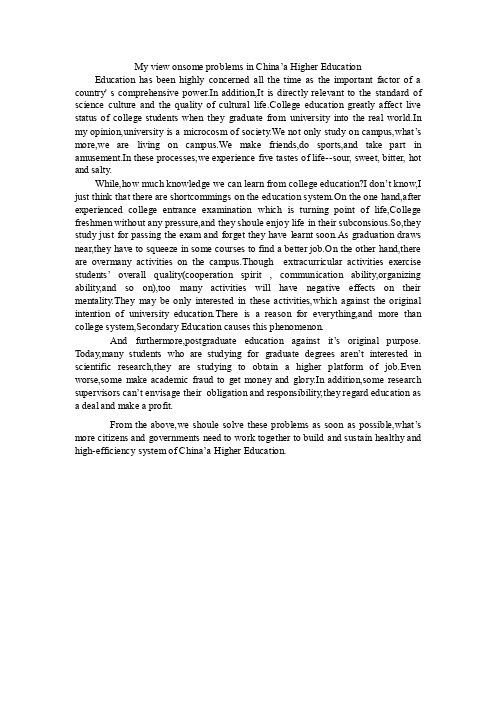
My view onsome problems in China’a Higher Education Education has been highly concerned all the time as the important factor of a country' s comprehensive power.In addition,It is directly relevant to the standard of science culture and the quality of cultural life.College education greatly affect live status of college students when they graduate from university into the real world.In my opinion,university is a microcosm of society.We not only study on campus,what’s more,we are living on campus.We make friends,do sports,and take part in amusement.In these processes,we experience five tastes of life--sour, sweet, bitter, hot and salty.While,how much knowledge we can learn from college education?I don’t know,I just think that there are shortcommings on the education system.On the one hand,after experienced college entrance examination which is turning point of life,College freshmen without any pressure,and they shoule enjoy life in their subconsious.So,they study just for passing the exam and forget they have learnt soon.As graduation draws near,they have to squeeze in some courses to find a better job.On the other hand,there are overmany activities on the campus.Though extracurricular activities exercise students’overall quality(cooperation spirit , communication ability,organizing ability,and so on),too many activities will have negative effects on their mentality.They may be only interested in these activities,which against the original intention of university education.There is a reason for everything,and more than college system,Secondary Education causes this phenomenon.And furthermore,postgraduate education against it’s original purpose. Today,many students who are studying for graduate degrees aren’t interested in scientific research,they are studying to obtain a higher platform of job.Even worse,some make academic fraud to get money and glory.In addition,some research supervisors can’t envisage their obligation and responsibility,they regard education as a deal and make a profit.From the above,we shoule solve these problems as soon as possible,what’s more citizens and governments need to work together to build and sustain healthy and high-efficiency system of China’a Higher Education.。
中国教育的挑战英文作文

中国教育的挑战英文作文下载温馨提示:该文档是我店铺精心编制而成,希望大家下载以后,能够帮助大家解决实际的问题。
文档下载后可定制随意修改,请根据实际需要进行相应的调整和使用,谢谢!并且,本店铺为大家提供各种各样类型的实用资料,如教育随笔、日记赏析、句子摘抄、古诗大全、经典美文、话题作文、工作总结、词语解析、文案摘录、其他资料等等,如想了解不同资料格式和写法,敬请关注!Download tips: This document is carefully compiled by theeditor. I hope that after you download them,they can help yousolve practical problems. The document can be customized andmodified after downloading,please adjust and use it according toactual needs, thank you!In addition, our shop provides you with various types ofpractical materials,such as educational essays, diaryappreciation,sentence excerpts,ancient poems,classic articles,topic composition,work summary,word parsing,copyexcerpts,other materials and so on,want to know different data formats andwriting methods,please pay attention!China's education faces numerous challenges. One major issue is the immense pressure placed on students. From a young age, they are expected to excel academically and secure a place in a top university. This intense competition often leads to high levels of stress and anxiety among students. They are constantly under the scrutiny of their parents, teachers, and peers, which can take a toll on their mental health.Another challenge is the rigid examination-oriented education system. Students are primarily evaluated based on their performance in standardized tests, which puts a heavy emphasis on rote memorization. This approach limits creativity and critical thinking skills. Many argue that this system fails to prepare students for real-world challenges and hinders their overall development.Furthermore, there is a significant disparity in educational resources between urban and rural areas. Urbanschools tend to have better facilities, more qualified teachers, and access to advanced technology. On the other hand, rural schools often lack basic resources and struggle to attract qualified teachers. This inequality in education opportunities further widens the gap between urban andrural areas, perpetuating social and economic inequality.In addition, the curriculum in China is heavily focused on traditional subjects such as math, science, and language. While these subjects are important, there is a lack of emphasis on practical skills and vocational education. As a result, many students graduate without the necessary skills for the job market, leading to high unemployment rates among graduates.Moreover, the education system places little emphasison holistic development. Extracurricular activities, suchas sports, arts, and music, are often neglected in favor of academic pursuits. This narrow focus on academic achievements neglects the importance of cultivating well-rounded individuals and stifles students' creativity and personal growth.Lastly, there is a growing concern over the quality of teachers in China. Many teachers are overworked and underpaid, which affects their motivation and effectiveness in the classroom. Additionally, the lack of professional development opportunities hinders their ability to adapt to new teaching methods and technologies.In conclusion, China's education system faces numerous challenges, including excessive pressure on students, a rigid examination-oriented approach, inequality in educational resources, a lack of emphasis on practical skills, neglect of holistic development, and concerns over the quality of teachers. Addressing these challenges is crucial to ensure that China's education system can effectively prepare students for the future and fostertheir overall growth and well-being.。
- 1、下载文档前请自行甄别文档内容的完整性,平台不提供额外的编辑、内容补充、找答案等附加服务。
- 2、"仅部分预览"的文档,不可在线预览部分如存在完整性等问题,可反馈申请退款(可完整预览的文档不适用该条件!)。
- 3、如文档侵犯您的权益,请联系客服反馈,我们会尽快为您处理(人工客服工作时间:9:00-18:30)。
Some Problems in China’s Higher EducationHigher education plays a very key role for the rest of us at a time in life. We, with high excitement and expectancy, leave our own hometowns to a new world. The higher school not only gives us warm nests shielding off outside unrelated communities, but also provides us a comprehensive schedule to learn lessons inside their great walls. During these years we can learn many things in a liberal education, supplying us with a solid basic education and one or more sets of competence in dealing with all kinds of tests and details of a special field, but the organizational grooves and narrow routines in academic education are increasingly diminishing the motivation and dynamic of students and teachers.As we know, a good education should train students to think for themselves, but the value outlook of traditional education pays much attention to the examination system.A student can or can’t gain credits and graduate late is due to weather he or she can pass the all kinds of tests designed by school or other institutions. So what has to be learnt in many higher schools is rigidly laid down by a syllabus, which lowers the standards of teaching and learning as well. Thus not only can’t motivate students to learn widely, but also deprive the teacher of all freedom. Another problem in higher education is that there is less relationship between the theories and practices. What we have been learning now in a lot of time is the knowledge of the theories, which maybe underlie the students of the basic knowledge, but at the same time, it also makes students lose a lot of opportunities to discover and implement patterns by themselves in practice, and in the end leads them to be unfamiliar to realistic development of social environment. The third problem maybe is that many schools pay more and more emphasis on competence education. Commitment has been diminishing day and day. Now the highlight among higher school students is how to complete their needed course and earn credits. The students, as well as the school, are devoting their energies to the pursuit of material or personal development in now or future, and commitment seems increasingly disappear in their daily life. To serve for others or society seems of service seems a dated idealism.In my opinion, higher education should offer outstanding and specialized talents for society, and act as the home of mankind’s spirit as well. So higher education shouldfind some equilibrium pots among universities, government and society on the one hand, and on the other, set up equilibrium between economic interest and moral civilization. Only if higher education in China sets up the equilibrium and keeps it well, society would find the graduate students it needs and the graduate students could find their appropriate position in society, and real masters would arise in the future.The problems you mentioned are not specific to the educational systems in China. What is needed, as many experts concur, is a series of mandatory courses in ethics and moral studies, which are often lacked in most educational systems in the world. And the schools' effort to make these courses a requisite for all students might be impractical due to many materialistic concerns because of the value system the society has place upon its citizens. As you have more than subtly hinted in your article, just as equally important to a person as the person's academic achievement are her sense of self-worthiness, -respect, -esteem, her ability to think critically and independently, her ethic standard, and her commitment to her civic responsibilities as a citizen of her country. These are aspects of life a mere degree in higher education cannot offer to its recipient.This problem is not a simple thing to change. There are many things to improve Chinese education mechanism. We can only discuss some aspects of this problem and express ourselves. However, it will only be solved when most of chinese people realize and have an incentive to correct this problem.Wish that this day will come earlier!Differences between Chinese and Western Education[Abstract]:Most Chinese parents like to ask, “How old should be the best age for children to study overseas?” “Is the foundational education as good as China in other countries?” As the matt er of fact, the argument about the differences and their advantages and disadvantages between Chinese Education and Western Education is keeping on all the time. This question is also one major concern among those students who are considering going abroad. In order to find out the most suitable way for eachindividual, we shall compare matters both in China and foreign countries in this paper.摘要:大多数华人家长要问: “孩子出国留学的最佳年龄是多少?” “其他国家的基础教育跟我过的一样么?”。
